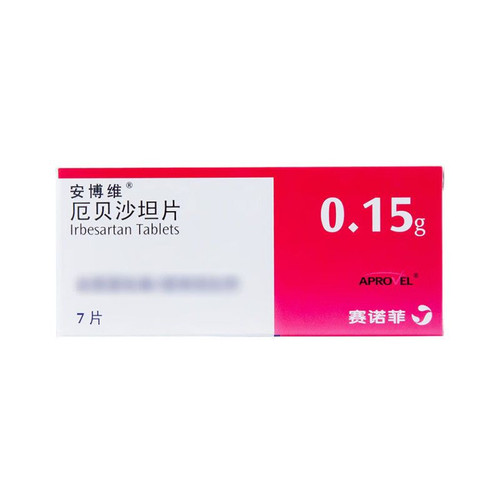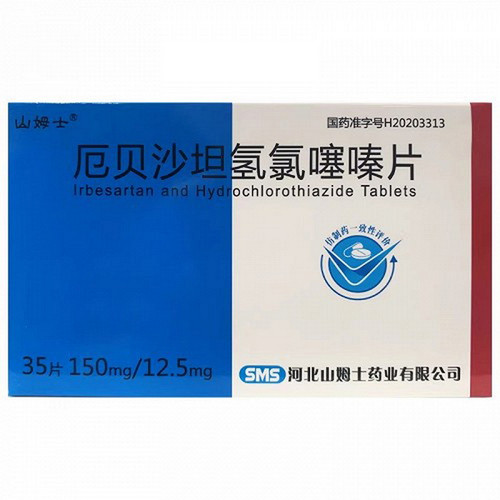Product Overview
[Drug Name]
Generic Name: H Irbesartan Hydrochlorothiazide Tablets
Trade Name: An Bo Nuo H Irbesartan Hydrochlorothiazide Tablets 150mg: 12.5mg x 7 tablets
Pinyin Full Code: AnBoNuo HEBeiShaTanQingLvZuoZuoPian 150mg: 12.5mg x 7 tablets
[Main Ingredients]
See package insert for details.
[Properties]
This product is a film-coated tablet that appears white or off-white after removal of the coating.
[Indications/Main Functions]
For the treatment of essential hypertension. This fixed-dose combination is indicated for the treatment of patients whose blood pressure is not adequately controlled with irbesartan or hydrochlorothiazide alone.
[Specifications]
150mg: 12.5mg x 7 tablets
[Dosage and Administration]
This product is taken once daily on an empty stomach or with a meal. It is indicated for the treatment of patients whose blood pressure is not adequately controlled with 150mg of irbesartan or hydrochlorothiazide alone. Patients are advised to adjust their dosage of either single component (i.e., irbesartan or hydrochlorothiazide) and then substitute the combination. Once-daily doses exceeding irbesartan 300mg/hydrochlorothiazide 25mg are not recommended. If necessary, this product can be used in combination with other antihypertensive medications (see Drug Interactions).
[Adverse Reactions]
Common adverse reactions include headache, dizziness, palpitations, and occasional cough. These are generally mild and transient, and most patients tolerate the medication well. Urticaria and angioedema are rare. Literature reports of adverse reactions with an incidence greater than 1% for this product include: dyspepsia, heartburn, diarrhea, skeletal muscle pain, fatigue, and upper respiratory tract infection, but these reactions were not significantly different from the placebo group. Other adverse reactions with an incidence greater than 1% but lower than the placebo group include abdominal pain, anxiety, nervousness, chest pain, pharyngitis, nausea and vomiting, rash, sinus abnormalities, and tachycardia. The incidence of hypotension and orthostatic hypotension is approximately 0.4%.
[Contraindications]
This product is contraindicated in patients with allergies.
[Drug Interactions]
Other Antihypertensive Drugs: When this product is used in combination with other antihypertensive drugs, its antihypertensive effect may be enhanced. Irbesartan and hydrochlorothiazide (irbesartan and hydrochlorothiazide doses up to 300 mg/25 mg) can be safely used in combination with other antihypertensive drugs, calcium channel blockers, and beta-blockers. The use of irbesartan with or without thiazide diuretics may lead to hypovolemia if high-dose diuretics are used prior to treatment. This treatment carries a risk of hypotension unless volume depletion is corrected first.
[Precautions]
1. Correct any hypovolemia and/or sodium depletion before initiating treatment. 2. Patients with renal insufficiency may require a reduced dose of this product. Changes in blood urea nitrogen, serum creatinine, and potassium should also be monitored. Some sensitive patients may experience changes in renal function as a result of renin-angiotensin-aldosterone inhibition. 3. Overdose of this product may cause hypotension, tachycardia, or bradycardia. Induce vomiting, gastric lavage, and supportive care should be employed. Irbesartan cannot be excreted through hemodialysis. 4. Drug Interactions: This product has no significant interactions with hydrochlorothiazide, digoxin, warfarin, or nifedipine. However, when used with diuretics, caution should be exercised as hypovolemia or hyponatremia may cause hypotension. Elevated serum potassium should be avoided when used with potassium-sparing diuretics (such as triamterene). Concomitant use with digitalis drugs such as digoxin, β-blockers such as atenolol, and calcium channel blockers such as nifedipine does not affect the pharmacokinetics of these drugs. 5. No dose adjustment is required for patients with hepatic impairment, mild to moderate renal impairment, or the elderly. 6. Pediatric Use: No safety data are available for patients under 18 years of age.






